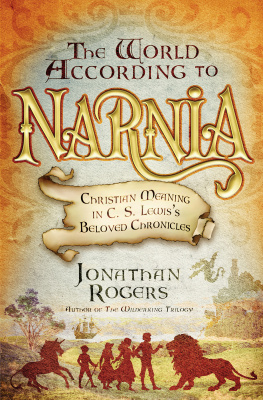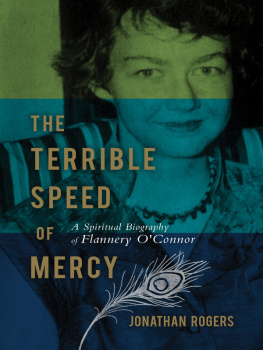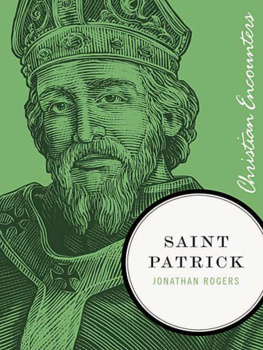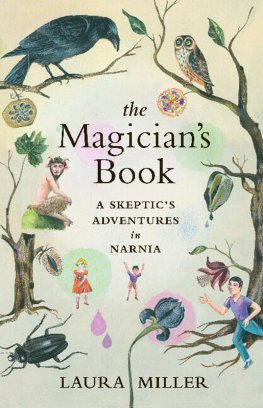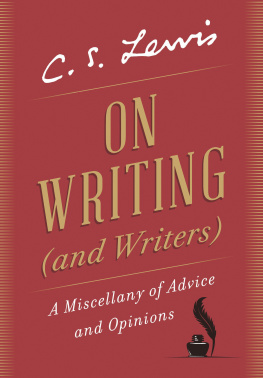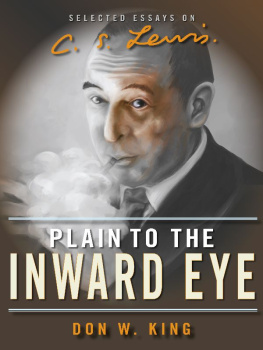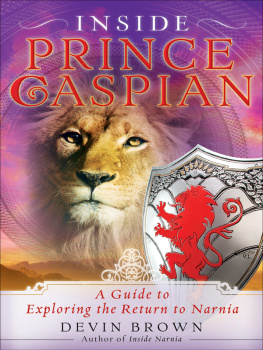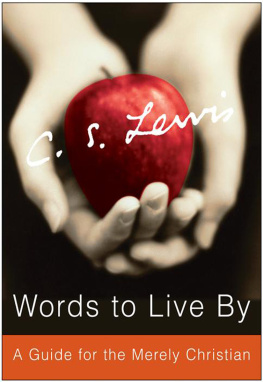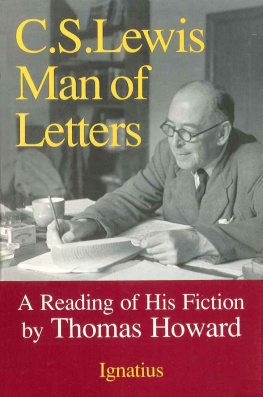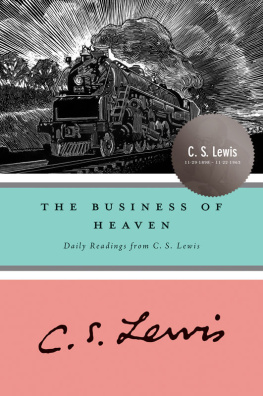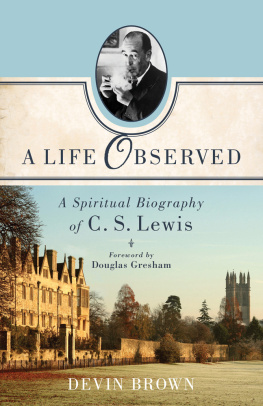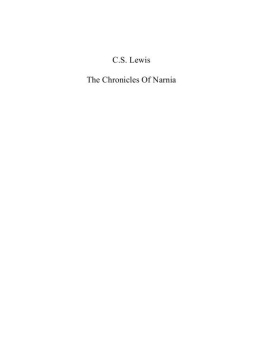Jonathan Rogers - The World According to Narnia: Christian Meaning in C. S. Lewiss Beloved Chronicles
Here you can read online Jonathan Rogers - The World According to Narnia: Christian Meaning in C. S. Lewiss Beloved Chronicles full text of the book (entire story) in english for free. Download pdf and epub, get meaning, cover and reviews about this ebook. year: 2009, publisher: FaithWords, genre: Art. Description of the work, (preface) as well as reviews are available. Best literature library LitArk.com created for fans of good reading and offers a wide selection of genres:
Romance novel
Science fiction
Adventure
Detective
Science
History
Home and family
Prose
Art
Politics
Computer
Non-fiction
Religion
Business
Children
Humor
Choose a favorite category and find really read worthwhile books. Enjoy immersion in the world of imagination, feel the emotions of the characters or learn something new for yourself, make an fascinating discovery.
- Book:The World According to Narnia: Christian Meaning in C. S. Lewiss Beloved Chronicles
- Author:
- Publisher:FaithWords
- Genre:
- Year:2009
- Rating:4 / 5
- Favourites:Add to favourites
- Your mark:
- 80
- 1
- 2
- 3
- 4
- 5
The World According to Narnia: Christian Meaning in C. S. Lewiss Beloved Chronicles: summary, description and annotation
We offer to read an annotation, description, summary or preface (depends on what the author of the book "The World According to Narnia: Christian Meaning in C. S. Lewiss Beloved Chronicles" wrote himself). If you haven't found the necessary information about the book — write in the comments, we will try to find it.
The World According to Narnia: Christian Meaning in C. S. Lewiss Beloved Chronicles — read online for free the complete book (whole text) full work
Below is the text of the book, divided by pages. System saving the place of the last page read, allows you to conveniently read the book "The World According to Narnia: Christian Meaning in C. S. Lewiss Beloved Chronicles" online for free, without having to search again every time where you left off. Put a bookmark, and you can go to the page where you finished reading at any time.
Font size:
Interval:
Bookmark:
Copyright 2005 by Jonathan Rogers
All rights reserved. No part of this book may be reproduced in any form or by any electronic or mechanical means, including information storage and retrieval systems, without permission in writing from the publisher, except by a reviewer who may quote brief passages in a review.
Unless otherwise noted, Scriptures are taken from the New American Standard Bible, Copyright 1960, 1962, 1963, 1968, 1972, 1975, 1977, 1995
by The Lockman Foundation. All rights reserved.
Scriptures noted KJV are taken from the King James Version of the Bible.
Scriptures noted NIV are from the HOLY BIBLE, NEW INTERNATIONAL VERSION. NIV. Copyright 1973, 1978, 1984 by International Bible Society. Used by permission of Zondervan. All rights reserved.
Warner Faith
Hachette Book Group
237 Park Avenue, New York, NY 10017
Visit our website at www.HachetteBookGroup.com
The Warner Faith name and logo are registered trademarks of the Hachette Book Group.
First eBook Edition: November 2005
ISBN: 978-0-446-55692-7
E2-20181211-PDJ-PC-VAL
For Lou Alice, near and far.
Steve Wilburns fingerprints are all over this book, from the title on. His rigorous standards spurred me to write a better book than I could have written without him. Im also thankful to John Eames, whose vigilance opened the first of many doors for The World According to Narnia. Thank you, Gary Terashita, for shepherding this book to completion. Particular thanks go to my wife and family who, as always, made many sacrifices during the last push toward the deadline for this book. And some credit must surely go to my parents and sisters, who taught me how to read and write and have been a source of much encouragement ever since.
Imagining Reality
C. S. Lewis once received a letter from the mother of a nine-year-old boy named Laurence. Laurence was afraid the Chronicles of Narnia had led him into idolatry: he felt he loved the Great Lion Aslan more than he loved Jesus. What, the mother wanted to know, should she say to her son?
Lewis always took the sensitivities of children seriously, and his response to the boys concerns was characteristically thoughtful and reassuring. He wrote: Laurence cant really love Aslan more than Jesus, even if he feels thats what hes doing. For the things he loves Aslan for doing or saying are simply the things Jesus really did and said. So that when Laurence thinks he is loving Aslan, he is really loving Jesus: and perhaps more than he ever did before.
That, really, is how the Narnia stories do their work on you. Instead of giving you a lecture on the importance of staying warm, Lewis builds a fire and says, Herefeel this. You can hardly help but love Aslan for the things he says and does. You can hardly help but desire whats good and right and true. You can hardly help but feel that a life of virtue is an adventure you wouldnt want to miss.
Christianity begins with a set of facts to believe, presented in the form of a story: God became a man, lived a perfect life, died to pay for the sins of his people, and rose again to lead them into heaven. But faith, in the end, isnt just about acknowledging truths, even truths as important as those. The demons believe that set of facts. The facts can matter to usreally matteronly if they are translated to our wills and desires. And that happens by way of the imagination. As Lewis put it, Reason is the natural order of truth; but imagination is the organ of meaning.
Elsewhere he makes the point that if it werent for the imagination, the immensity of the universe would be no more awe-inspiring than the proliferation of numbers in the telephone directory: Men look on the starry heavens with reverence: monkeys do not. Imagination is a serious business. It gives substance to our yearnings for something beyond ourselves. Imagination is what convinces us that theres more to the world than meets the eye. And isnt that the first principle of faith?
As young Laurence found, the truths of the gospel can leave a believer cold. Thats not a comment on the gospel or its power, but rather a comment on the state of the human heart, which can sleep through whole hurricanes of love and grace. The gospel permeates the life of the believer by way of the imagination. The Chronicles of Narnia awaken the reader to the imaginative possibilities of the gospel that have been there all along. The Chronicles serve as a reminder that if the gospel doesnt fill you with overwhelming awe and joy and fear and hope, you may not have really understood what the gospel says.
One of the delicious ironies of Narnia is the fact that Lewis so carefully constructs a world of metaphor in order to insist that the God of the Bible is not a mere metaphor. Throughout the Chronicles, characters who think theyre using imaginative language turn out to be talking about real life. Digorys Aunt Letty idly wishes for fruit from the land of youth to heal Digorys mother; Digory goes to the land of youth and fetches some. In Prince Caspian, Trumpkin the dwarf thinks Susans horn of help is make-believe, but once he hears it, he wonders why nobody blew it sooner. In The Silver Chair, Jill Pole sees a peculiar line of huge rocks and wonders if they might have given rise to legends of giants in the North. Then the rocks stand up and reveal themselves to be real giants!
Lewis can be unsparing toward those who would reduce Aslan to an abstraction or an idea rather than a living, breathing lion, more real than the whole world put together. Consider the scene toward the end of The Horse and His Boy in which Bree, a rather self-satisfied talking horse, tries to explain his concept of Aslan to Hwin and Aravis:
No doubt, continued Bree, when they speak of him as a Lion, they only mean hes as strong as a lion or (to our enemies, of course) as fierce as a lion. Or something of that kind. Even a little girl like you, Aravis, must see that it would be quite absurd to suppose he is a real lion. Indeed it would be disrespectful. If he was a lion hed have to be a beast just like the rest of us. Why! (and here Bree began to laugh) If he was a lion hed have four paws, and a tail, and Whiskers!
Enamored of his own voice, his eyes half-closed with smug superiority, Bree doesnt notice what Hwin and Aravis cant miss: that Aslan the Great Lion is approaching from behind.
The brush of Aslans whisker against his ear is enough to send Bree running for terror and for shame at having been such a fool. Aslan appears on the scene with an alarming reality that makes the real world seem pale and shadowy by comparison. Touch me, Aslan insists. Here are my paws, here is my tail, these are my whiskers. Aslan is no abstraction but a true beast, as concrete as Bree himself. It is a supremely Narnian moment: the old, familiar story of Doubting Thomas springs vividly to life as the reader comes to terms with what it would be like to be face-to-face with God made flesh.
In the end, things work out well for Bree because he realizes he is a fool and he wishes to be wise. Uncle Andrew, the magician of The Magicians Nephew, doesnt fare so well. As Lewis writes, What you see and hear depends a good deal on where you are standing; it also depends on what sort of person you are. And Uncle Andrew is the kind of person who cant see any reality beyond the one he has created for himself.
Uncle Andrew, like Digory, Polly, and Frank the cabman, is on hand at the creation of Narnia. But whereas the others are enraptured by Aslans creation song and the miracle of a world appearing where no world had been before, Andrew is so self-absorbed and terrified that he misses the whole thing.
When the Lion had first begun singing, long ago when it was still quite dark, he had realized that the noise was a song. And he had disliked the song very much. It made him think and feel things he did not want to think or feel. Then, when the sun rose and he saw that the singer was a lion (
Next pageFont size:
Interval:
Bookmark:
Similar books «The World According to Narnia: Christian Meaning in C. S. Lewiss Beloved Chronicles»
Look at similar books to The World According to Narnia: Christian Meaning in C. S. Lewiss Beloved Chronicles. We have selected literature similar in name and meaning in the hope of providing readers with more options to find new, interesting, not yet read works.
Discussion, reviews of the book The World According to Narnia: Christian Meaning in C. S. Lewiss Beloved Chronicles and just readers' own opinions. Leave your comments, write what you think about the work, its meaning or the main characters. Specify what exactly you liked and what you didn't like, and why you think so.

